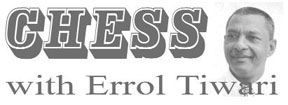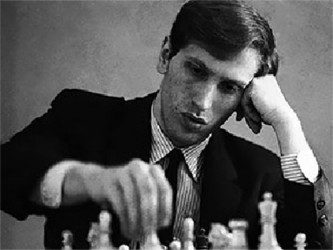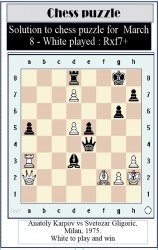In addition to offering a detailed analysis of his life experiences for the publication Sport Express, the 12th World Chess Champion Anatoly Karpov accommodated notable freelance chess writer Irwin Fisk with an interview which dealt solely with the American grandmaster Bobby Fischer. Fischer is undisputedly, the most famous chess player who has ever lived. He was an artist who selected chess as his medium of expression and promoted the ancient game as an art.
While others were studying Dostoevsky or Shakespeare or attending ballet, Fischer was learning the nuances of the 15th century Ruy Lopez or determining why Steinitz played 12. N-N1 against Anderssen in Vienna, 1866. It has been said that Fischer knew more about chess theory than any other player in history, before chess computers were introduced. He expired in 2007 at age 64, the same number of squares on the chess board that he had so loved.
Following his enormous victory over the Soviet world champion Boris Spassky in Reykjavik, 1972, Fischer was scheduled to oppose Karpov in 1975, as the new challenger. But the match never happened, and naturally, Karpov won the world championship title by default. Fischer had presented FIDE (the world chess federation) with new, radical ideas some of which were implemented for the 1975 match. At the time, his polemic shook the very structure of world chess. For example, instead of following a tournament procedure for the Candidates, Fischer proposed a series of matches with the loser of each match being eliminated. Also, Fischer proposed that draws should not be counted, and the world championship title should go to the player who first wins six games. Obviously, such a method would rule out prearranged draws in tournaments, or the collusion to effect draws among contestants. Loris Nathoo, a local national chess player, believes also that only a ‘match’ would determine a most worthy Guyana national chess champion.

Irwin Fisk: When did you first become aware of Bobby Fischer?
Anatoly Karpov: People started to talk about Fischer, but I was living very far from Moscow at that time and we had no Internet, no TV, so information was slow in coming. But, of course after the Candidates Match everyone knew Fischer.

IF: How old were you in 1971?
AK: I was 20 years old. I was already one of the strongest grandmasters.
IF: Spassky was in preparation to play Fischer for the world championship. Had you played Spassky?
AK: Yes, I played a training match with Spassky. He asked me to play training games, but we played only one game. Spassky won this game even though he had a lost position, but I made a stupid mistake, and after this suddenly Spassky said he didn’t want to continue this training match, so maybe he was happy he beat me in that game.
IF: Where was this game played?
AK: We were near Moscow.
IF: Was it at a training facility?
AK: Spassky had a training session before he left for Reykjavik. He had some problems in putting together his team and making last minute preparations, so he wasn’t concentrating so much on chess. I stayed at the training session two weeks, and almost every day Spassky was going to Moscow and coming back. It was near Moscow, like 60 km from Moscow, but he had to go to the city every day, so you can’t concentrate. We were analyzing a lot. [Efim] Geller was there. Then, [Nikolai] Krogius was there, then Iivo Nei, so that was his team. Reykjavik was soon, and I was there, but the main piece [Spassky] was not there. Spassky only came in the evenings, and as I said it was not very serious what he had done.
IF: Were you playing at a government facility?
AK: No, it was at a health resort.

AK: He was very self-confident and he had a positive score in his previous games. He had played well against Fischer in previous games before the match. Spassky, as I said, was quite sure he would beat Fischer in spite of the impressive results Fischer showed in the Candidates Matches. It is known that Spassky is not a big worker or hard worker in chess. He is quite lazy, so he didn’t work too much on chess. This was the main reason he was defeated by Fischer. If you recall the games, it was game four when Spassky with black showed a fantastic novelty which was prepared by him and his team. I know this novelty. But, what happened is Spassky didn’t make the effort to memorize it, because it was winning by force.
Geller told me when they started to repeat this before the game, Spassky, after three or four moves into the novelty, said, ‘Oh, this is not so important, because I will find the moves over the board.’ So, he didn’t remember the moves and he didn’t win the game, which had already been won at home. This was extremely important because Spassky won the first game, a strange game. Better not to say that Spassky won the game, but that Fischer lost the game. Then, Fischer didn’t appear for the second game, and Fischer won the third game, so if Spassky had won game four with black, he most probably would have won the match. He just didn’t play well after game four.
Both players had lost so much energy in the first 11 games that they were like boxers in the last round. Tired. Spassky could have won many games in the second part of the match, but he missed everything. Then, Fischer won everything. It certainly brought chess to the forefront.
IF: Did you go to Reykjavik?
AK: No, I didn’t go to Reykjavik. This was a mistake by the sport leaders of the Soviet Union, because it was considered that I should go, not as a part of Spassky’s team but just to watch and understand the championship match and to get experience. In an official document from the [Soviet] Federation, one of the sports leaders in the Ministry of Sport wrote that it was too early for Karpov to go, because they didn’t see a great future for me for the world championship [laughter].
I watched the games. We were making preparations for the World Chess Olympiad. I was there with [Tigran] Petrosian and [Paul] Keres and [Viktor] Korchnoi and [Mikhail] Tal. I mostly analyzed with Keres and Korchnoi.
IF: Where was this?
AK: Near Moscow. I remember that summer because it was very hot and there were fires all around Moscow. Fire of the turf. You could smell the smoke. We were in the city of Dubna. Dubna is famous for its nuclear energy institute, and Dubna at that moment was one of the chess centrEs. Many scientists played chess, so they liked chess players to come there. So we stayed in the hotel in the middle of the city. We analyzed together with Keres and Korchnoi most of the games that Spassky played against Fischer. I found ways that Spassky could get a winning position in the opening of the Alekhine Defence. Fischer played the Alekhine Defence and Spassky missed a very big advantage. (To be continued)
IF: Geller and Krogius went to Reykjavik, as I recall?
AK: It was the team of Spassky, Geller, Krogius and Iivo Nei from Estonia. We had our team, the Soviet Union team, which was preparing for the Chess Olympiad.
IF: What were the team members saying as the Spassky vs Fischer moves were coming in?
AK: We could see it was a very big fight. Very emotional. Actually, my friends on the team with whom I was working were impressed by one of the adjournments where Fischer had the advantage, but after the adjournment he played a very sharp line and he analyzed very deep because it looked dangerous. But Fischer analyzed very deep and won the game which had many complications. We were impressed by the quality of his analysis of that game. Fischer showed many novelties in the opening, so it was clear that Fischer had prepared very well.
I know Fischer was playing 1.e4 so much before the match that there was a cartoon on the cover of Chess Life that featured Spassky at the board, surrounded by the Soviet team. One asks, “But Boris, what if he doesn’t play 1.e4?”
IF: Were they training for a variety of openings or did they place more emphasis on e4?
AK: I wasn’t there for all of the training, but Fischer had to play 1.d4.
IF: At what point did you and your team realize that you were going to lose the match?
AK: Fischer took the lead very quickly after he lost the first games. Spassky couldn’t show anything; he was playing very bad. It was already clear that Fischer was playing better chess at that moment. Later, nobody expected Fischer to lose. (To be continued)
Chess games
The following games were played at the Reykjavik Open Chess Tournament. The tournament is ongoing and concludes on March 18.
White Julio Ernesto Granda
Zuniga
Black Jaime Martinez Lopez
1. e4 c6 2. d4 d5 3. e5 Bf5 4. Be2 e6 5. g4 Be4 6. f3 Qh4+ 7. Kf1 Bg6 8. Be3 Nd7 9. Nd2 Qd8 10. Nh3 f6 11. exf6 Ngxf6 12. Nf4 Bf7 13. Nd3 Bd6 14. f4 Bg6 15. Kg2 Ne4 16. Nf3 O-O 17. h4 c5 18. h5 Be8 19. h6 g6 20. c3 Rc8 21. Rc1 a6 22. Nd2 Ndf6 23. dxc5 Nxc5 24. Nxc5 Bxc5 25. Bxc5 Rxc5 26. Nb3 Rc7 27. Qd4 Ne4 28. Rcf1 Qd6 29. Qe5 Qxe5 30. fxe5 Rff7 31. Nd4 Ng5 32. Rxf7 Rxf7 33. Bd3 Bd7 34. Kg3 Rf8 35. Rh2 Rf7 36. Rc2 Rf8 37. c4 Rc8 38. Kh4 Nf7 39. cxd5 Rxc2 40. Bxc2 Nxe5 41. dxe6 Be8 42. Be4 b6 43. Kg5 Nc4 44. Kf6 1-0.
White Sergei Movsesian
Black Alberto Prieto
1. e4 e5 2. Nf3 Nc6 3. Bb5 Nd4 4. Nxd4 exd4 5. Bc4 h5 6. d3 c6 7. O-O a5 8. a4 d6 9. c3 dxc3 10. Qb3 Qe7 11. bxc3 Be6 12. Nd2 Rh6 13. f4 b5 14. Bxe6 Qxe6 15. axb5 Qxb3 16. Nxb3 a4 17. f5 d5 18. Bxh6 gxh6 19. bxc6 dxe4 20. f6 exd3 21. Nd4 Kd8 22. Rf5 Kc7 23. Kf2 a3 24. Ke3 Rb8 25. Kxd3 Rb2 26. Nb5+ Kxc6 27. Nxa3 Rxg2 28. Nc4 1-0.
White Pavel Eljanov
Black Yuri Eijk
1. c4 Nf6 2. Nc3 g6 3. e4 d6 4. d4 Bg7 5. Nf3 O-O 6. Be2 e5 7. O-O Nc6 8. d5 Ne7 9. b4 Nh5 10. Re1 f5 11. Ng5 Nf6 12. f3 a5 13. b5 Ne8 14. Qb3 b6 15. Rd1 f4 16. Ne6 Bxe6 17. dxe6 Qc8 18. Nd5 Bf6 19. a4 Ng7 20. c5 bxc5 21. Bc4 Ra7 22. b6 cxb6 23. Nxf6+ Rxf6 24. Qxb6 Ne8 25. Qxa7 1-0.




